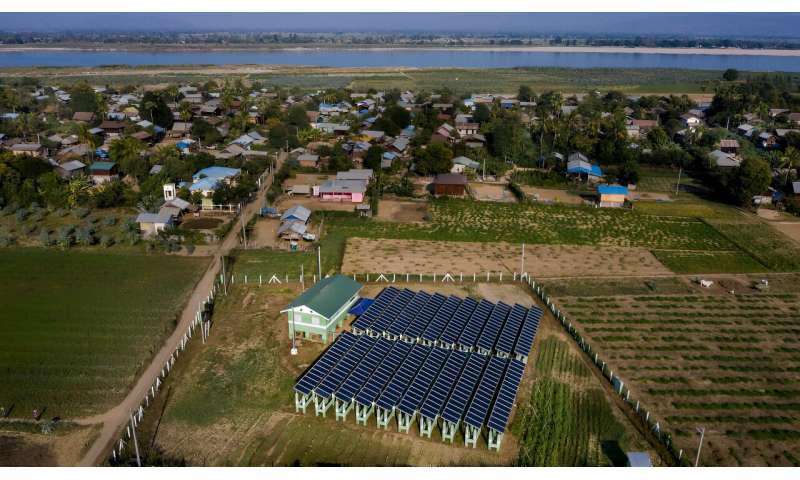System change in Southeast Asia's energy transition

Across the world, glittering cityscapes—emblems of progress—cast shadows over underprivileged communities battling for essential electricity access.
These disparities resonate across regions around the world, underscoring the need for thoughtful and effective solutions on a global scale.
Recent figures from the Asian Development Bank showed that 350 million people in the Asia and the Pacific region have only limited access to electricity, while 150 million people still have no access at all.
More than 40% of the region's population lack access to modern fuels for cooking, relying instead on biomass as an energy source or primary cooking fuel. In Southeast Asia, this is particularly prevalent in Indonesia, Myanmar, Cambodia and Vietnam.
According to the International Energy Agency's (IEA) most recent "Outlook" report for the region, Southeast Asia will fall short on its target to provide access to clean cooking for all by 2030. This carries profound implications for health, education and future opportunities.
A fundamental energy shift in Southeast Asia is not only critical but a unique opportunity to transform lives and uplift communities. The scale of the challenge is immense. But given that the energy divide poses a formidable barrier to development, perpetuates poverty and contributes to environmental degradation, it is vital to overcome.
Faced with a challenge of this scale, it is difficult to see how anything less than a systemic change will suffice.
We need to reimagine the foundations of energy production, distribution and consumption—not just in Southeast Asia but on a global scale. It is a transformation that goes beyond the adoption of new technologies; it necessitates a comprehensive overhaul of the energy ecosystem.
Grassroots innovators
The Bezos Earth Fund works with stakeholders across the renewable energy value chain. We know that on-the-ground efforts are pivotal for a swift and effective shift to clean energy.
Yet historically, last-mile communities have often struggled to access critical climate finance resources due to perceived risks and concerns over high transactions costs.
This is why we are heavily focused on providing flexible, early-stage capital enabling local innovators to develop, test and improve their initiatives, and ultimately bring about system change.
Recognizing and incentivizing change are also pivotal in driving progress.
Global accolades such as the Zayed Sustainability Prize play a crucial role in providing early support to grassroots innovators. One of the winners, Ignite Power, has reached more than 2.5 million people across Sub-Saharan Africa with solar-based off-grid solutions.
Wateroam, a 2022 recipient of the prize, has made substantial strides in access to clean water through innovative approaches in water purification and disaster relief, including most recently in Malaysia.
Working with such organizations in Southeast Asia and across the globe, the Bezos Earth Fund wants to fund projects that not only reduce emissions but also promote economic development and skills training at the local level.
It is only through this approach that we can overcome the significant remaining barriers and drive transformation during what is increasingly a pivotal decade for climate action.
Our partnership with other leading foundations within the Global Energy Alliance for People and Planet has, in under two years of existence, disbursed grants that will avoid a further 6 million metric tons of CO2 and catalyzed the creation of more than 20,000 clean energy jobs in the process.
Successes have included demand aggregation for renewable technologies in Nigeria, metro grid deployments in the Democratic Republic of Congo, and progress towards a just transition from coal in South Africa's Mpumalanga province.
Unlocking minerals
Returning to Southeast Asia, the region is also emerging as a key supplier of critical minerals.
The IEA's recent Southeast Asia Energy Outlook notes that if the region develops processing and manufacturing capabilities for critical mineral-based industries, revenue from the production of nickel, tin, copper and rare earth elements could see a near 2.5-fold increase by 2050.
This transformative progress has the potential to unlock just, inclusive and sustainable economic opportunities for local communities by seeing them actively participate in the growth of multiple industries.
As we move ahead following vital international gatherings such as the UN climate summit COP28, we must collectively channel and respond to the critical experiences of the energy transition in Southeast Asia, home to some 690 million people. Underestimating its relevance would be a grave oversight, as it directly affects a significant portion of the global population. And this is just one part of the world where so much more must be done.
I believe this energy transformation presents an extraordinary opportunity to improve millions of lives, bringing impoverished communities out of the shadows and into the light. It demands a united and unwavering commitment marked by pioneering innovation and steadfast collaboration.
The world must join forces to forge a formidable alliance, illuminating the path toward a brighter and more sustainable future for Southeast Asia and beyond.
Provided by SciDev.Net